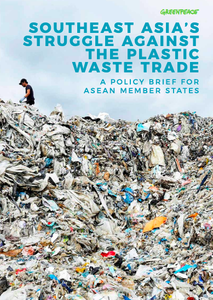Executive Summary
As leaders from the 10 countries that make up the Association of Southeast Asian Nations (ASEAN) prepare to meet in Bangkok for the 34th ASEAN Summit this June, it is perhaps surprising to note that the issue of plastic waste imports does not currently feature on the three-day agenda. Indeed, the last year has seen many of these nations, notably Malaysia, Philippines and Thailand, leading a growing push back against a deluge of unwanted and toxic shipments of waste from the developed world since China’s decision to ban imports. And it’s easy to see why by just looking at the statistics. Between 2016 and 2018, the ASEAN region saw plastic waste imports grow by a staggering 171%, from 836,529 tonnes to 2,265,962 tonnes. That’s equivalent to around 423,544 20-foot shipping containers.
Making matters worse, much of it is mislabeled as ‘recyclable’ even though the shipments constitute hundreds of thousands of tonnes of contaminated plastic and other mixed wastes from developed countries that cannot be processed. Some of these imports are illegally shipped into the region, leaving receiving nations with no real capacity to deal with such waste grappling with the magnitude of the mess.
Since the spike in imports, countries have taken measures to counter the growing tide of imports. In recent months, both Malaysia and the Philippines have very publicly sent back waste shipments to their country of origin. Thailand has announced its intention to ban plastic waste imports by 2021. Malaysia has stopped issuing new permits for importing plastic waste. Vietnam has also stopped issuing new licenses for the import of waste and has overseen a crackdown on illegal shipments as thousands of containers of paper, plastic and metal scrap build up at the country’s ports, raising concerns about environmental impacts.
But these unilateral measures cannot be the answer to this global waste crisis. Evidence suggests that as countries enact bans and contingency policies, they only help to move the problem elsewhere as importers seek out areas where regulations and restrictions are weaker. They also do not address a deeper underlying issue: how single-use disposable plastic is the greatest obstacle to sound waste and resource management, both within the ASEAN region and globally.
In a policy brief for ASEAN 2017, Greenpeace Southeast Asia called for a ban on single-use plastics, and urged leaders to regulate plastic use and production at source. However, progress has been slow and these issues remain to be addressed if this crisis is to be averted.
Greenpeace Southeast Asia and other environmental groups have documented evidence in the last year, highlighting the significant risk this waste poses to local environments and those living nearby as unspoiled areas are turned into toxic dumpsites overnight.
Therefore, Greenpeace Southeast Asia demands that ASEAN leaders put this issue on the agenda during their summits this year and make a united declaration to address the region’s plastic waste crisis. Greenpeace recommends a three-point strategy for ASEAN member states to adopt as they urgently work towards a ‘Single-use Plastic-Free World’.
-
- Declare an immediate ban on all imports of plastic waste, even those meant for “recycling,” and ensure all ASEAN countries ratify the Basel Ban Amendment.
- Establish a holistic regional policy geared toward massively reducing the production of single-use plastic packaging and products, and facilitating innovation on reusable packaging and alternative delivery systems; and
- Advance a sustainable and ethical circular economy framework, grounded on zero waste approaches, that protects human health and the environment, and enables the ASEAN region to decouple growth from excessive resource extraction, production, consumption and wastage.
Download the Greenpeace Southeast Asia’s ASEAN Policy Brief 2019

